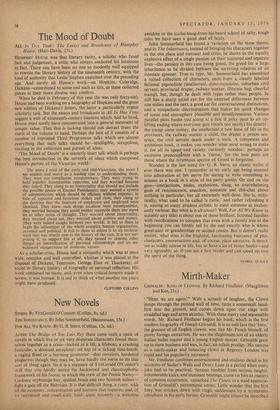The Mood of Doubt
ALL IN DUE TIME: The Essays and Broadcasts of Humphry House. (Hart-Davis, 15s.) HUMPHRY HOUSE was that literary rarity, a scholar who fused fact and judgement, a critic who always anchored his intuitions
in fact. There can have been no one so modestly well equipped to rewrite the literary history of the nineteenth century, with the kind of authority that Leslie Stephen exercised over the preceding
age. And surely all House's work—on Hopkins, Coleridge, Dickens—contributed to some end such as this, as these collected
pieces in their more diverse way confirm. When he died in February of this year (he was only forty-six), House had been working on a biography of Hopkins and the great new edition of Dickens's letters, the latter a particularly urgent
scholarly task. But the essays and broadcasts in All In Due Time suggest a web of nineteenth-century interests which, had he lived, House must surely have concentrated into a general statement of
unique value. That this is lacking should not detract from the merit of the volume to hand. Perhaps the best of it consists of a number of reprinted Third Programme talks which are almost everything that such talks should be—intelligible, scrupulous, exciting in the collection and pursuit of ideas. `The Mood of Doubt' is a masterly short talk which is perhaps
+ the best introduction to the network of ideas which composed House's picture of the Victorian world: The more I read of the early and mid-Victorians, the more I see anxiety and worry as a leading clue to understanding them. They were not complacent compromisers. They were trying to hold together incompatible opposites, and they worried because they failed. They clung to an immortality that should not include the possible justice of Eternal Punishment; they wanted a system of administration which should be efficient without expense; in face of repeated and ferocious strikes and riots, they clung to the doctrine that the interests of employers and employed were identical. They knew such things as.these were incompatibles; they worried because they could neither reconcile them nor move on to other terms of thought. They worried about immortality, they worried about sex, they worried about politics and money. They were indeed caught between two worlds. It fell to them to begin the adjustment of the whole complex human organisation, personal and political. It fell to them to adjust it to an environ- ment that was utterly new in the history of the race. It is not sur- prising if, to support life at all, they turned to (among other things) an intensification of personal relationships and an un- balanced exaggeration of domestic virtues.
As a scholar-critic, House had a sympathy which was at once wide, complex and well controlled, whether it was placed at the disposal of Dickens, Tennyson, George Eliot or Thackeray; of social or literary history; of biography or personal reflection. His work contained no waste, and, even when critical honesty made it severe, it was human. It is sad to think of what another ten years might have produced.
CLIFFORD COLLINS


































 Previous page
Previous page